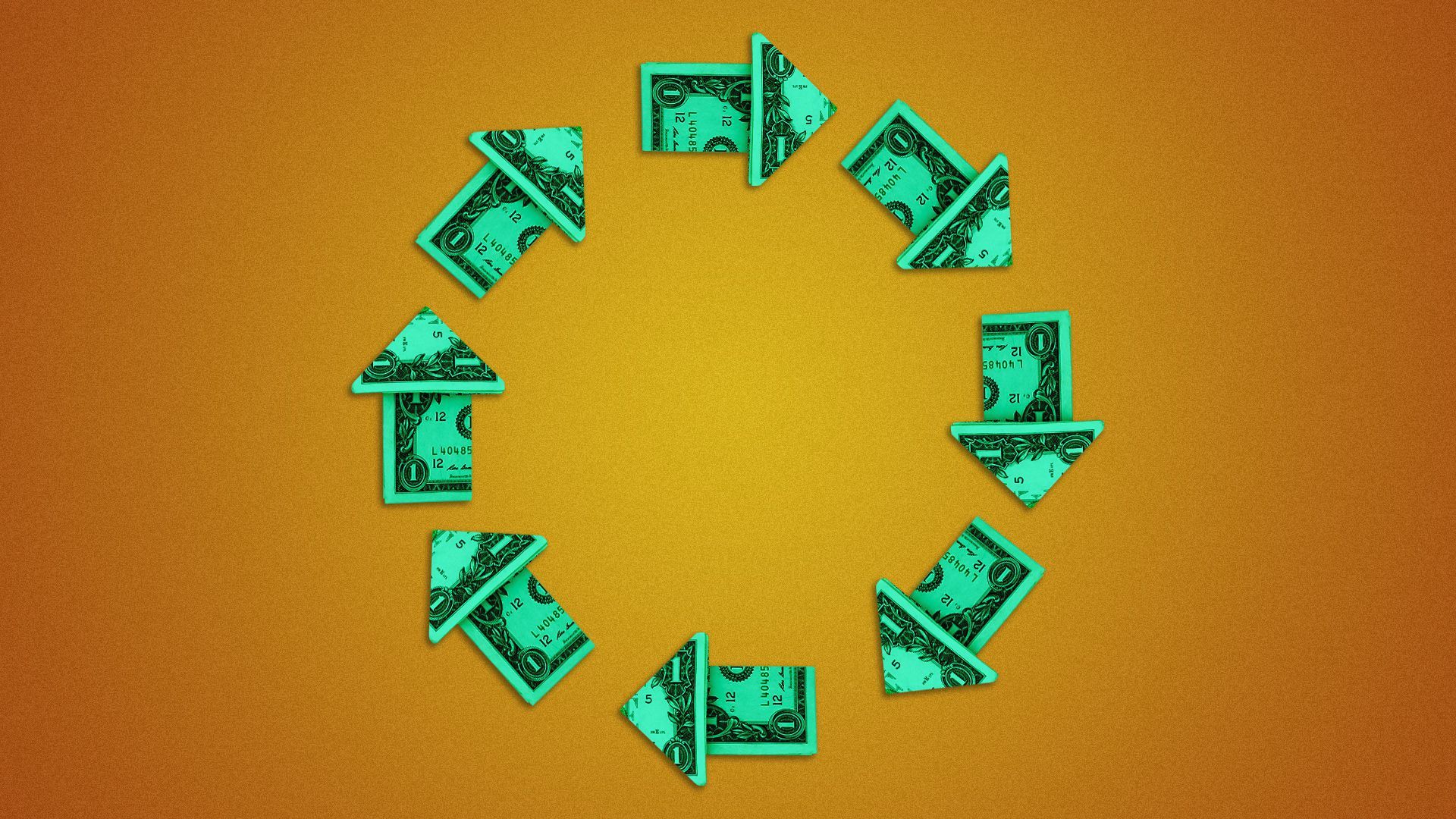| | | | | | | Presented By ICE | | | | Axios Generate | | By Ben Geman and Andrew Freedman · Jun 07, 2022 | | 🍩 Good morning! Today's Smart Brevity count is 1,117 words, 4.5 minutes. 📬 Did a friend send you this newsletter? Welcome, please sign up. 🎶 Happy birthday to the late genius Prince, who provides today's intro tune... | | | | | | 1 big thing: $20 million for circular economy startup |  | | | Illustration: Aïda Amer/Axios | | | | First look: Rheaply, a Chicago-based startup that helps companies quantify and manage their purchased goods and resources to cut carbon emissions, tells Axios it has raised $20 million in intermediate funding, Andrew writes. Why it matters: CEO Garry Cooper Jr. says Rheaply is going after low-hanging fruit that, if tackled at scale, could yield significant benefits in avoided or reduced emissions. How it works: Rheaply operates software that is used by about 50,000 people, Cooper said. This includes employees at some 25 companies, including Google, Exelon and AbbVie, as well as universities such as MIT, where students and faculty can use the platform to reuse lab equipment. Context: The new funding round is led by Steve Case's Revolution's Rise of the Rest Seed Fund. Additional funders include other prominent investors such as the John Doerr Family Trust, PSP Partners and Emerson Collective. The big picture: Rheaply is in a unique spot for aiding in and benefiting from the corporate sector's fast-growing focus on accounting for and cutting greenhouse gas emissions. - The company is looking to expand its work in the energy and utility sector specifically, including by building a circularity community at Nicor Gas in Illinois, which aims to hit net-zero methane emissions from its operations by 2030.
- Rheaply is working to develop enterprise resource planning technology that will help organizations to track and exchange resources, such as office equipment, from the purchasing to the waste stage.
- Its newest product, launched three weeks ago, aims to help companies account for the avoided carbon emissions from reusing resources, paving the way for integrating such actions into their sustainability targets.
Between the lines: A rare Black CEO in the climate tech sector, Cooper said he's also looking to address climate justice, given the tendency for landfills to be located in lower-income and underrepresented communities. - Cooper, a neuroscientist by training who once focused on researching treatments for Parkinson's disease, says the new funding will be put to use in product development.
What they're saying: "While so much of our energy is spent thinking about how to build new things in a more sustainable way, we just throw away massive amounts of what we have already built," said Penny Pritzker, chairman of PSP Partners, who served as commerce secretary under President Obama, in a statement to Axios. Read more. |     | | | | | | 2. Three takeaways from Biden's clean energy move |  Data: Yahoo Finance; Chart: Baidi Wang/Axios Let's spend more time with the new White House moves to boost clean power deployment while aiding domestic manufacturers, Ben writes. 1. It's not just about solar. The intense political battle over tariffs has gobbled up attention, but yesterday the White House said it's using purchasing powers under the Defense Production Act to try and boost a suite of technologies. - They include heat pumps, electrolyzers and fuel cells, insulation, transformers and grid components, and more.
- It's hardly the green new deal, but the White House is pursuing a more muscular industrial policy approach with existing powers.
- Yes, but: It's too soon to know what new or expanded manufacturing may flow from wielding the 1950 law.
2. A bunch of solar stocks popped. The most concrete step was a two-year reprieve on panel import tariffs that may flow from the Commerce Department's probe into whether China is dodging those duties. - Companies that provide tech for utility-scale solar projects saw big gains (see above), but panel installers and others benefited, too.
- The MAC Global Solar Energy Index and the Invesco Solar ETF both rose over 4% yesterday, even as the pace of return from the big project slowdown remains uncertain.
3. Things are still pretty tense. First Solar, a major domestic panel manufacturer, slammed the tariff waivers as providing "unfettered access to China's state-subsidized solar companies for the next two years." - "This sends the message that companies can circumvent American laws and that the US government will let them get away with it," it said.
- Auxin Solar, the manufacturer whose petition launched the Commerce probe, also attacked the waivers.
📉 Breaking: New solar industry data out this morning shows that U.S. installations fell to their lowest levels in two years in Q1, down 24% from the same stretch in 2021. Go deeper |     | | | | | | 3. 🛢️Get used to high oil prices for a while — banks | | Oil market analysts are upping their price outlooks in the latest sign that the commodity surge won't abate anytime soon, Ben writes. Driving the news: Via Bloomberg, Goldman Sachs analysts have raised their Brent crude forecast to $140 in the third quarter. - "Morgan Stanley said it sees upside to its bull case estimate of $150" in the July-September period, it reports.
- And Reuters reports: "On Monday, Citibank and Barclays raised their price forecasts for 2022 and 2023, saying they expected Russian output and exports to fall by around 1-1.5 million bpd by end-2022."
⛽ The average U.S. gasoline price is creeping closer to $5 per gallon, with AAA reporting that it's currently up to $4.92. |     | | | | | | A message from ICE | | 4 motivations that drive ESG data use | | |  | | | | Data is a key to the ESG revolution, and a more tailored approach can help inform better outcomes. How it's done: It can be helpful to examine the motivation of a data user through four categories: right thing, risk, revenue and regulation. Learn more. | | | | | | 4. Carbon removal player aims for "franchise" model |  | | | Illustration: Aïda Amer/Axios | | | | Direct air capture startup Carbon Engineering and oil giant Occidental Petroleum have a plan they hope will enable the buildout of what's now nascent and costly tech, Ben writes. Driving the news: Occidental subsidiary 1PointFive and Carbon Engineering announced the outlines of what its CEO, Daniel Friedmann, calls a "franchise-like model" for systems that directly remove CO2 from the atmosphere. "Through this process, plant components and equipment will be modularized, mass manufactured and then assembled on-site using an established supply chain of vendors," the companies said. Why it matters: Most paths for meeting Paris Agreement goals pair emissions cuts — the main weapon against warning — with tech that sucks up already emitted CO2. But direct air capture and other approaches are in their very early stages, even as more investment flows into the sector. Zoom in: 1PointFive and Carbon Engineering are planning their first plant in Texas and hope to have it running in late 2024. The broad vision of standardized, modular units sees 70-135 plants built worldwide by 2035, each with an annual removal capacity of 1 million metric tons. Yes, but: Even a buildout at that level underscores the breadth of the climate challenge — and why many removal companies and technologies would be needed. Current energy-related global CO2 emissions are well over 30 billion metric tons annually. |     | | | | | | 5. Quote of the day | | "The climate change problem is at a point where even extreme options need to be thought about seriously. Now, to be clear, thinking about them includes the possibility of rejecting them. But not thinking about them does not seem to be a responsible path forward." — Climate Overshoot Commission executive secretary Jesse Reynolds Reynolds is discussing the controversial idea of geoengineering in an interview with the Associated Press. |     | | | | | | A message from ICE | | Accidental greenwashing: helping asset managers avoid it | | |  | | | | As investor appetite for sustainable funds booms, greenwashing is a growing concern. What you're missing: For asset managers who face a huge choice of data sets, it can also be accidental. But there are steps they can take to verify the attributes of their product. | | | | 🙏Thanks for reading and we'll see you back here tomorrow. |  | It's called Smart Brevity®. Over 200 orgs use it — in a tool called Axios HQ — to drive productivity with clearer workplace communications. | | | | | | Axios thanks our partners for supporting our newsletters. If you're interested in advertising, learn more here.
Sponsorship has no influence on editorial content. Axios, 3100 Clarendon Blvd, Suite 1300, Arlington VA 22201 | | | You received this email because you signed up for newsletters from Axios.
Change your preferences or unsubscribe here. | | | Was this email forwarded to you?
Sign up now to get Axios in your inbox. | | | | Follow Axios on social media:    | | | | | |
No comments:
Post a Comment